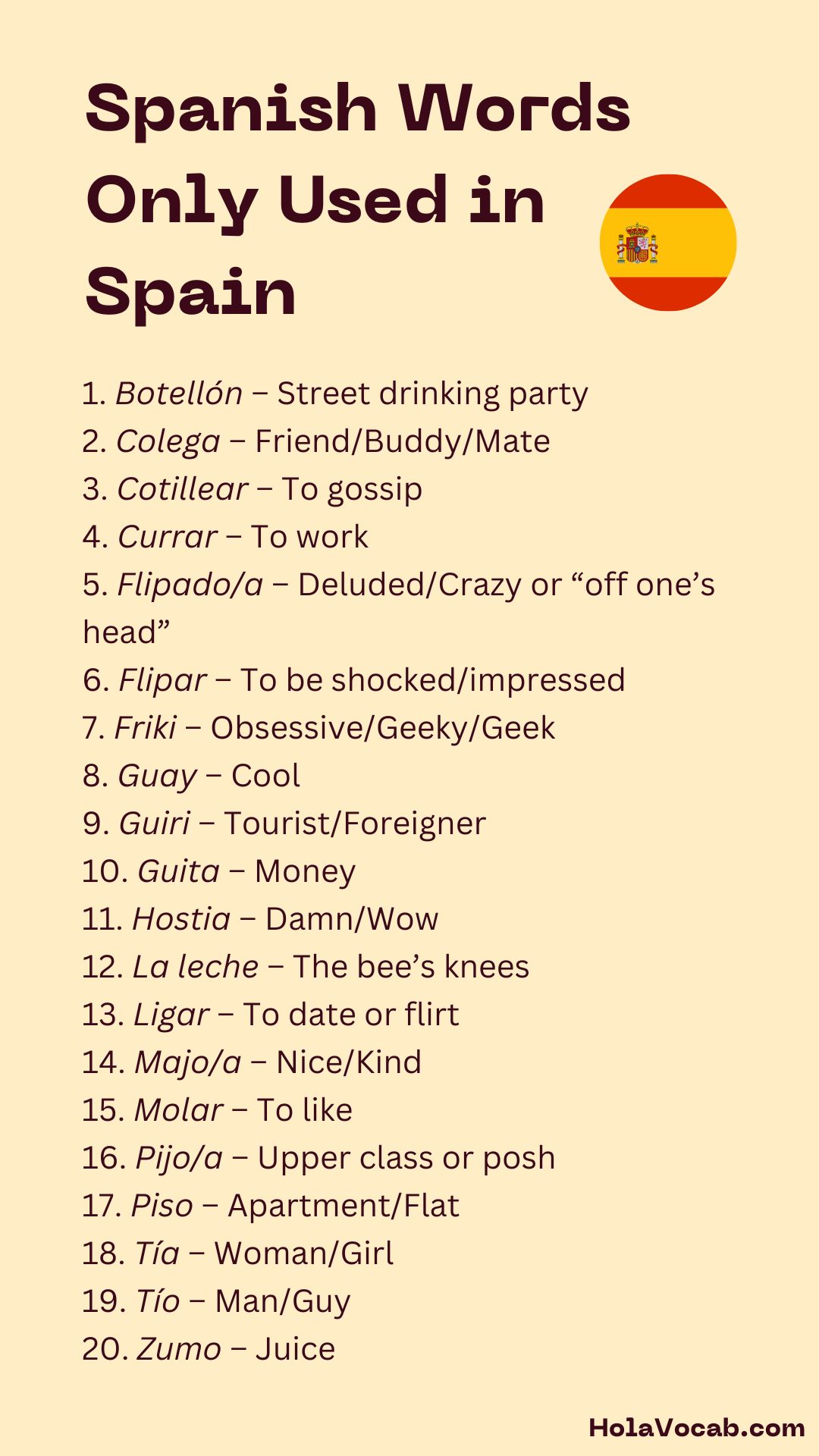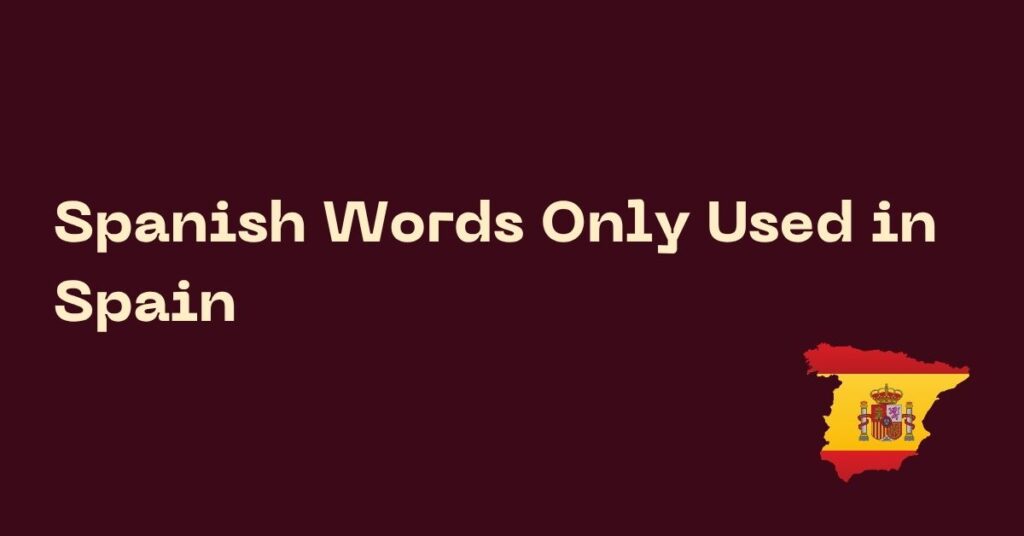Below is a list of Spanish words that are frequently used in Spain but rarely heard elsewhere, with an example sentence for each.
1. Botellón – Street drinking party
The word “botellón” refers to an informal gathering of people (often teenagers) to drink alcohol in the streets. It doesn’t have an exact translation in English.
Example: Cuando yo era estudiante, hacíamos botellones todos los fines de semana. – When I was a student, we had botellones every weekend.
2. Colega – Friend/Buddy/Mate
In standard Spanish, “colega” means “colleague”. However, in informal Peninsular Spanish, it can be used to mean “friend”.
Example: ¿Qué pasa, colega? ¡Cuánto tiempo sin verte! – What’s up, buddy? Long time no see!
3. Cotillear – To gossip
Example: Estaban cotilleando en la oficina sobre la nueva empleada. – They were gossiping in the office about the new employee.
4. Currar – To work
Example: Este verano me toca currar en un chiringuito en la playa. – This summer I have to work at a beach bar.
5. Flipado/a – Deluded/Crazy or “off one’s head”
This adjective comes from the verb “flipar” (below), and is used to describe someone who has deluded, exaggerated ideas, or is intoxicated by drugs.
Example: ¡Menuda flipada de tía! Se cree la reina del mundo. – What a crazy woman! She thinks she’s the queen of the world.
6. Flipar – To be shocked/impressed
This verb comes from English “to flip [out]” and can mean “to be shocked”, “to be impressed” or “to be high/on drugs”.
Example: ¡Estoy flipando con los precios de este restaurante! – I’m freaking out over the prices at this restaurant!
7. Friki – Obsessive/Geeky/Geek
This word comes from English “freaky”, and can be used as both an adjective and a noun to refer to someone who is particularly obsessive or geeky about something.
Example: Mi hermano es un friki de los videojuegos retro. – My brother is a retro video game geek.
8. Guay – Cool
Example: Ayer fuimos a un sitio super guay a cenar. – Yesterday we went to a super cool place for dinner.
9. Guiri – Tourist/Foreigner
The word “guiri” is used in a similar way to how “gringo” is used in Latin America. It especially refers to foreigners who are Northern European in appearance.
Example: En verano, esta playa se llena de guiris. – In summer, this beach is filled with tourists.
10. Guita – Money
Example: No salgo porque no tengo guita este mes. – I’m not going out because I don’t have any money this month.
11. Hostia – Damn/Wow
“Hostia” literally means “communion wafer”, but is used in Spain as an expression of surprise or admiration. Depending on the tone and context, it can be offensive or rude.
Example: ¡Hostia, qué coche más guapo! – Wow, what a nice car!
12. La leche – The bee’s knees
“Leche” literally means “milk”, which is a common word throughout the Spanish-speaking world. However, in Spain the phrase “la leche” is used in a similar way to the phrase “the bee’s knees” in English.
Example: Esta serie es la leche, ¡tienes que verla! – This series is awesome, you have to watch it!
13. Ligar – To date or flirt
Example: Anoche intentó ligar con una chica en la discoteca. – Last night he tried to pick up a girl at the club.
14. Majo/a – Nice/Kind
Example: Qué majo es tu primo, me cayó genial. – Your cousin is so nice, I really liked him.
15. Molar – To like
The verb “molar” is used in a similar way to “gustar”.
Example: Esta canción mola un montón, ¿cómo se llama? – This song is really cool, what’s it called?
16. Pijo/a – Upper class or posh
Example: Ese barrio está lleno de pijos con coches caros. – That neighborhood is full of posh people with expensive cars.
17. Piso – Apartment/Flat
Example: El piso es pequeño, pero tiene mucha luz. – The apartment is small, but it has a lot of light.
18. Tía – Woman/Girl
Tía literally meants “aunt”. However, in Spain it’s frequently used to mean “woman”. You can use it either to refer to a woman in the third person, or to address someone directly. It’s quite informal and familiar.
Example: La tía del bar me puso mala cara. – The woman at the bar gave me a dirty look.
19. Tío – Man/Guy
Tía literally meants “uncle”, but in Spain it’s often used to mean “man” or “guy”. Like with the word tía, you can use it either to address someone directly, or to refer to someone in the third person.
Example: ¡Tío, qué pasada de concierto anoche! – Man, what an awesome concert last night!
20. Zumo – Juice
In Latin America, the standard word for “juice” is “jugo”. In Spain, the word “zumo” is used instead.
Example: Quiero un zumo de naranja, por favor. – I’d like an orange juice, please.


